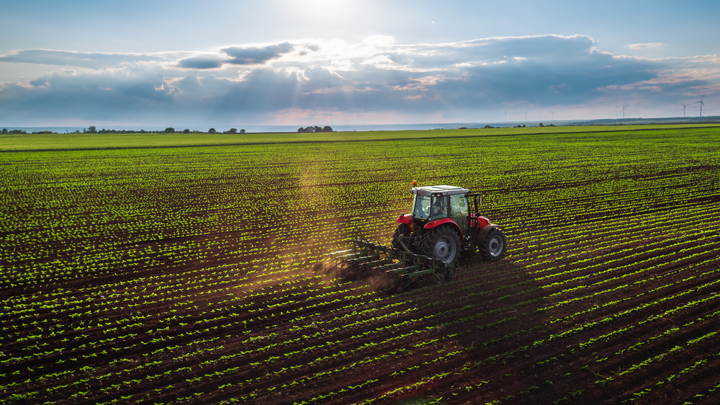IBISWorld presents a collection of fast facts for the different sectors of the UK economy.

Agriculture, Forestry & Fishing
-
The EU has warned the UK it must meet its commitment to check goods entering Northern Ireland before talks can begin on an agrifood trade deal. The agreement, expected by 2027, aims to establish a veterinary or sanitary and phytosanitary agreement to boost agrifood trade between the partners. Any proposed deal aims to reduce costs and paperwork for farmers exporting meat, dairy, eggs and plants to the EU, where UK agrifood exports have fallen since Brexit. Delays risk prolonging uncertainty and keeping trade barriers in place for producers across Great Britain, supplying Northern Ireland and EU markets.
-
Extreme weather delivers a poor harvest, with farmers blaming heavy rainfall followed by prolonged dry spells for damaging yields. Government data released in January 2026 shows that all the main cereal crops saw reduced yields in 2025, except for winter barley. The final estimate of the 2025 UK wheat harvest is 12 million tonnes, an increase of 7.3% on 2024. This is due to a 9.1% increase in area to 1.7 million hectares, tempered by a 1.7% decrease in yield to 7.2 tonnes per hectare. Meanwhile, barley harvest stood at 6.4 million tonnes, a decrease of 10% compared to 2024. Spring barley saw a 16% fall in production and a 5.4% fall in yield, whereas winter barley saw a 1.2% increase in production and a 7.2% increase in yield.
-
A report published by McCain Foods in its inaugural Farmdex release in November highlighted the difficulties facing UK farmers. The survey found that 35% of farmers reported making no profit or only breaking even in the year to July, while just 14% said they achieved profits above 10%. Farmers pointed to continued post-Brexit pressures, including reduced subsidy support and challenging weather conditions, as key factors squeezing margins. Farmers blamed a mix of post-Brexit pressures, including shrinking subsidy support and tough weather conditions, for putting margins under strain.
-
Analysis from the Energy and Climate Intelligence Unit shows that record heat and drought cost Britain’s arable farms around £824 million in lost output in 2025. The losses follow the country’s hottest and driest spring on record and an exceptionally hot summer, which together pushed average yields of wheat, oats, spring and winter barley and oilseed rape roughly 20% below the 10-year average.
-
The UK government has been forced to roll back its proposed inheritance tax changes for farmers after fierce backlash. In the 2025 Budget, Rachel Reeves announced that farmland would no longer be exempt from inheritance tax, with a 20% levy on assets worth more than £1 million. The announcement on 23 December raised the threshold to £2.5 million, meaning just 15% of farms are now eligible, down from the 25% previously.
-
A government-commissioned review found that nearly a third of farms in Great Britain were loss-making in 2023-24, with many unable to generate sufficient income from food production alone to support a household. The report, published in December, found that rising input costs, volatile weather and policy shifts, including the removal of agricultural support schemes, have heaped pressure on farm incomes.
-
From 1 January 2026, a reciprocal beef quota with the US will allow 13,000 metric tonnes of high-quality British beef to enter the American market tariff-free. This should support the UK agricultural sector by opening a higher-value export outlet for beef producers.
-
In February 2026, McCain announced a UK “Farm of the Future” site in North Yorkshire, launching in 2026. Farm of the Future UK will partner with the University of Leeds to provide scientific research and validation to accelerate innovation in British agriculture. McCain’s Farm of the Future UK will be the most advanced Farm of the Future to date, adopting practices like controlled traffic farming, year-round soil cover and biodiversity building. It will also be the first Farm of the Future location to pilot a circular nutrient system. According to McCain’s recent Farmdex research, while many farmers are concerned about the future of UK farming, 77% agree that sustainable practices are essential.
-
UK food and farming groups are urging ministers to build in a transition period amid talks of realigning UK agri-food rules with the EU. Industry-commissioned analysis cited by the NFU and CropLife UK suggests abrupt alignment could cost the arable, horticulture and sugar sectors £500 million to £810 million in the first year, by removing access to some GB-approved crop protection products and undermining control of pests, weeds and disease.
-
Defra has awarded about £21.5 million to 15 projects in England under its Farming Innovation Programme (with Innovate UK), backing the first wave of funded work on precision breeding (including gene-editing) and on-farm/near-farm technologies to cut agricultural emissions.
-
UK farmers have warned of crops rotting in the ground after an exceptionally wet start to 2026. In southern England, the Financial Times reports that in Reading, where more than 100 global climate scientists met this week, rain has fallen for 32 consecutive days, the longest continuous spell in records going back a century.
-
The Food and Drink Federation has warned that the UK government will struggle to deliver on its pledge to strip out red tape for food and drink exports to the EU, citing poor preparation and staff shortages in key border and regulatory agencies. The body’s concerns over the practical challenges of implementing a new sanitary and phytosanitary deal have been echoed by other trade groups, which fear that rushed changes could add friction.

Mining
- The Office for National Statistics reports that the mining and quarrying sector output dropped by 0.7% in December 2025. However, output from the sector climbed by 1.4% in the three months to December 2025.
- World Bank Commodities Price Data released in February 2026 shows that the average Brent crude oil and WTI crude oil prices have climbed at the start of 2026 amid heightened global uncertainty and tensions. In Q4 2025, prices were lower than in the previous quarter and compared to Q4 2024. Recently, the International Energy Agency projected a record surplus in 2026, placing severe pressure on oil prices. This is backed by Goldman Sachs, which projects oil prices to decline through 2026 due to a production surge and a large surplus of two million barrels per day.
- Metal prices have been extremely volatile recently, with precious metals recording a huge rise. World Bank Commodities Price Data released in February 2026 shows all metals and minerals recording higher prices in January 2026. Most metals, except lead and nickel, ended Q4 2025 higher than Q4 2024. Meanwhile, gold and silver prices continued to rise, thanks to continued geopolitical tensions and economic instability, with both precious metals reaching record highs. A weakening US dollar and US policymaking concerns have encouraged investors to flock to gold, given its reputation as a “safe haven” asset. Gold surpassed US$5,300 (about £3,400) per ounce on 28 January, before a sharp sell-off eased prices going into February 2026. However, gold prices have since eased by mid-February, with investors cashing in on the recent surge.
- EDF is seeking to extend the operation of its Suffolk-based Sizewell B nuclear plant by a further 20 years, to 2055, to ease supply pressures until new nuclear capacity (at Hinkley Point C and Sizewell C) kicks in. The plant provides about 3% of the UK’s electricity and EDF and Centrica could invest £800 million to extend the operation, if the government can guarantee a long-term price for the electricity the plant produces, as per the Financial Times.
- The Tony Blair Institute for Global Change has urged the UK government to lift the ban on new oil and gas exploration licenses in the North Sea, as these are needed to protect thousands of workers. It has also called for the windfall tax to be wound down as it has deterred investment.
- The UK government’s Vision 2035 Critical Minerals Strategy, updated in late January 2026, sets out ambitions to produce 10% of domestic demand for key minerals and to host at least 50 active critical mineral projects, including mining. In the UK, it is anticipated that by 2035, demand for copper will almost double, while demand for lithium will increase by 1,100%. The UK faces limited domestic mining and processing capacity for many key inputs. It states that “as a net importer of critical minerals, the UK faces strategic vulnerabilities”, with the UK having to “work with international partners to build more resilient and diversified supply chains”. As such, the UK and the US signed a Memorandum of Understanding on critical minerals on 4 February 2026, whereas both countries “intend to support the supply of raw and processed critical minerals crucial to the commercial and defense industries of both countries”. The approach lays out an understanding of a common policy approach on the Securing Supply, Investment in Mining and Processing, Permits and Pricing on critical minerals.
- Cornish Metals has announced a letter of interest from the Export-Import Ban of the US, for as much as US$225 million (approx. £165 million) in funding to develop and restart the South Crofty tin mine in Cornwall. Investment would be conditional on the mine “providing a responsible supple of tin to the US, which has labelled it a critical mineral”, as reported by Bloomberg.

Manufacturing
-
In January 2026, UK manufacturing showed a notable upturn, with the S&P Global PMI for the sector rising to 51.8 from 50.6 in December, the highest reading since August 2024 and signalling expansion after recent weakness. Crucially, new export orders increased for the first time in four years, boosting optimism among producers and reflecting stronger demand from Europe, the US and China. While employment continues to fall, the pace of job losses has eased and business confidence is at its highest since before the 2024 Autumn Budget. The improved PMI supports expectations that the Bank of England will hold interest rates at 3.75%, though rising input costs and broader economic uncertainties persist for UK manufacturers.
-
In January 2026, British car, van, truck and bus production fell to its lowest level since 1952 in 2025, with output down 15.5% year on year to 764,715 vehicles, according to the Society of Motor Manufacturers and Traders. The slump reflected a cyberattack at Jaguar Land Rover, the closure of Vauxhall’s Luton plant, model changeovers at Nissan and trade disruption after US tariffs rose to 10% under Donald Trump. With 78% of cars exported, the sector remains exposed to protectionism, particularly emerging “Made in Europe” proposals from the EU. While the SMMT expects a 10% rebound in 2026 and output above one million vehicles by 2027 as new EVs launch, high energy costs and tighter EU rules of origin pose significant ongoing risks.
-
New research from Forterro shows many UK manufacturers and exporters are poorly prepared for the EU’s Digital Product Passport (DPP) regime, which is due to start in 2027 and will require detailed digital records of a product’s lifecycle, composition, traceability and sustainability for goods sold into the EU. Fewer than half (47%) of firms surveyed are even aware of the requirements and only 43% say they are ready to comply, with many citing regulatory complexity, lack of technology and limited internal resources as major barriers; some businesses expect to spend around £28,000 on preparations. This leaves UK manufacturers at risk of losing EU market access or facing penalties if they fail to meet DPP obligations, at a time when exports remain vital to sector recovery.
-
The UK’s plan to introduce a new carbon border tax has triggered alarm among heavy industry, with steel, cement and chemicals groups warning it could accelerate the decline of domestic manufacturing. The proposed carbon border adjustment mechanism, due to start in 2027, will levy charges on high‑emission imports so that companies which pay for their emissions in the UK aren’t undercut by cheaper, more polluting rivals overseas.
-
Greater commitments to defence spending have started to reshape parts of Britain’s old industrial base. In January, the Financial Times reported that a historic Sheffield steelmaker is being converted into the country’s newest gun factory, due to begin operations by spring 2026. South Yorkshire is among the regions chosen to benefit from a £250 million Defence Growth Deal, a key element of the government’s new Defence Industrial Strategy.

Utilities
- The UK government has cut subsidies for renewable power generators by tying support to the lower Consumer Prices Index (CPI) rather than the higher Retail Prices Index (RPI), a move designed to save taxpayers an estimated £270 million a year, but which reduces returns for green energy producers and could slow investment in clean power. The change reflects tightening fiscal priorities amid broader market and policy pressures on the energy transition, potentially dampening investor enthusiasm just as the sector grapples with decarbonisation goals and infrastructure costs.
- Major UK water companies are lobbying for the abolition of their regulator, Ofwat, arguing that reforms have slowed and that the sector would benefit from a lighter regulatory regime to boost investment and reduce costs. They claim the slow pace of change means Ofwat will continue to influence household bills and infrastructure decisions for another decade, complicating long-term planning. If successful, this push could reshape regulation in the utilities sector, potentially lowering companies’ compliance burdens but also raising concerns about consumer protections and oversight of essential services.
- UK-headquartered energy company Drax Group has begun a consultation that could see more than 350 roles cut in the UK and North America, representing over 10% of its 3,250-strong global workforce, as it reshapes its operations to focus on energy security and transition to lower-carbon generation. The consultation affects staff across the group as Drax adapts its organisational structure to future market conditions. The GMB union criticised the move as a betrayal of workers and local communities, calling for government intervention to secure a “just transition” for employees. Shares in the company have climbed around 46% over the past year.
- Britain is in a stand-off with France over how the costs of planned new power cables under the Channel should be shared between consumers on each side. The two countries already have three interconnectors with a combined capacity of about four gigawatts, and a further one gigawatt link has been proposed to deepen cross-Channel trade in electricity. However, in February 2026 the UK and French regulators said the conditions were not yet met to approve the project.
- In February, the UK government announced a record package of subsidies for new solar power capacity as it pushes towards its goal of decarbonising the power sector by 2030. Through the latest Contracts for Difference auction, it awarded support for 4.9 gigawatts of planned new solar farms, alongside 1.3 gigawatts of onshore wind and 21 megawatts of tidal stream projects, marking the strongest round yet.

Construction
-
Deloitte’s Regional Crane Survey shows UK construction shows signs of resilience heading into 2026, with new project starts increasing across key regional cities – Belfast, Birmingham, Leeds and Manchester – as the number of schemes rose to 53 in 2025 from 47 in 2024, though total units and floorspace under construction dipped slightly. Residential, student accommodation, hotel and office refurbs are driving activity, indicating a healthy forward pipeline and developer sentiment has shifted towards “committed construction” amid strategic public and private investment. Despite challenges like higher costs and regulatory pressures, the outlook for offices, residential and specialised sectors appears more positive for 2026.
-
Begbies Taynor Group finds UK construction firms are facing growing financial stress, with the number in “critical distress” rising by nearly 50% in 2025. The surge reflects tight margins, rising costs and project delays, which have pushed more companies into severe financial difficulty, threatening jobs and supplier relationships across the sector. While some parts of the UK construction pipeline remain resilient with continued starts in residential, retrofit and public projects, the sharp increase in distressed companies highlights fragilities in the industry’s financial health and suggests a tougher operating environment ahead for contractors, especially smaller and mid-sized businesses. The trend underscores the need for stronger cash-flow management and risk mitigation as demand patterns evolve.
-
UK construction activity showed tentative signs of stabilisation at the start of 2026, with the construction PMI rising to 46.4 in January 2026 from 40.1 in December 2025, a reading that had marked a five-and-a-half-year low. While the latest figure remained below the neutral 50 threshold, it represented the strongest reading since May 2025, suggesting the pace of decline is easing. Improving sentiment was partly linked to lower borrowing costs and reduced uncertainty following the Budget, though output growth remained constrained by elevated cost pressures.

Wholesale Trade
-
According to the Office for National Statistics, output in the wholesale and retail trade; repair of motor vehicles and motorcycles increased by 0.6% in December 2025. This was driven by a 1% rise in wholesale trade, except for motor vehicles and motorcycles.
-
The Institute of Chartered Accountants in England and Wales’ Business Confidence Monitor reveals that retail and wholesalers remain among the least confident businesses in the UK in Q4 2025, with significant concerns relating to weakened consumer demand, tax challenges and regulations and competition.
-
Co-op Wholesale has secured a five-year contract extension to supply all Ascona forecourts across the UK. This is an extension to an agreement that began in 2020, with the wholesalers to supply all 62 forecourts with grocery products, including Co-op's own-label items. In October 2025, The Grocer reported that Co-op Wholesale has further expanded its presence in the forecourt market by signing a multi-year agreement with Tankerford to become its primary supply partner for its 11 forecourt convenience stores.
-
World-leading cooling technology and HVAC wholesaler, Beijer Ref, has moved to consolidate by uniting its three UK businesses and rebranding its Irish operations (Dean and Wood, RW Refrigeration and HRP in England and DWG Refrigeration Wholesale in Ireland) to achieve efficiencies.
-
Lynas Foodservice, one of the largest family-run foodservice distributors across Northern Ireland, the Republic of Ireland and Scotland, has announced the acquisition of Scotland’s leading independent foodservice wholesalers, JB Foods. The move boosts Lynas Foodservice’s reach in Scotland.
-
Mizkan Euro, owner of condiment brands like Branston and Sarson’s, has opted for RH Amar as its exclusive UK distributor. UK food distributor RH Amar also works with food companies like Del Monte.
-
Leading UK wholesalers, Parfetts and J.W. Filshill, have adopted a new AI-driven platform, Wholepal, to modernise technical product data sharing across the supply chain. The tool removes manual new line forms, accelerating routes to market for wholesalers, as reported by WholesaleManager.
-
Finlay’s Food, which was acquired in 2024 by the UK’s largest bakery wholesaler, BAKO Group, has been rebranded as Bako. It supplies products to customers in the Republic of Ireland, Northern Ireland, the UK, Europe and Asia.
-
AF Blakemore, a wholesaler to Spar retailers and other food, retail and hospitality brands, has reported a dip in revenue in the year ending April 2025, while also recording its first operating profit loss since 2022, citing high food inflation, subdued consumer confidence and reduced demand for products like tobacco, vapes and alcohol.

Retail Trade
-
UK retail footfall showed tentative signs of stabilising in January 2026 as the decline slowed sharply to 0.6 % year-on-year, compared with a -2.9 % slump in December 2025, according to British Retail Consortium-Sensormatic data, offering “cautious optimism” after prolonged weakness. High streets and shopping centres still saw fewer visitors, while retail parks bucked the trend with a 1.1% rise, and Scotland (5.1%) and Northern Ireland (3.8%) outperformed other regions. The data suggests consumer confidence may be improving, yet overall ins below pre-Christmas levels, emphasising continued pressure on in-store retail and the need for strategies that drive foot traffic back to shops.
-
The latest BRC-KPMG Retail Sales Monitor shows UK retail sales enjoyed a notable January 2026 uplift, with total sales rising 2.7% year-on-year, above the 12-month average of 2.3%, as many shoppers delayed Christmas purchases and responded to New Year discounts. Food sales grew 3. % and non-food by 1.7%, while in-store non-food sales rose 2%, and online non-food climbed 1.3%, signalling stronger footfall and promotional success after a subdued December. Nonetheless, consumer confidence remains fragile and heavier discounting may pressure margins, underscoring persistent cost pressures and cautious spending in the sector.
-
The British Retail Consortium warns that elevated labour and operational costs are keeping UK inflation above the Bank of England’s 2% target, particularly in food prices, despite expectations it might ease. Retailers have absorbed billions in higher employer National Insurance Contributions, wage bills and packaging taxes, with the Monetary Policy Committee linking ‘wage and price pressures’ to continued inflationary stickiness. This persistent inflation dampens consumer confidence, as shoppers remain cautious and seek lower prices. It also pressures margins across the sector, potentially constraining spending and investment while forcing retailers to balance cost pass-through and promotional strategies to sustain demand.
-
Theft remains a critical issue for the UK sector, with shoplifting offences rising 5% to 519,381 in the year to September 2025 according to Office for National Statistics data, fuelled in part by organised crime targeting multiple stores. Retailers say theft also drives violence and abuse against staff, undermining worker safety and adding to operational pressures. The government’s forthcoming Crime and Policing Bill aims to remove the £200 “low-level” theft threshold and create a specific offence for assaulting retail workers, but persistent high theft levels continue to dent profitability, increase security costs and strain an already challenging trading environment.
-
In a 27 January British Retail Consortium release, UK shop price inflation unexpectedly rose to 1.5% year-on-year in January, up from 0.7% in December and above the three-month average of 0.9%, signalling that price pressures have not peaked as anticipated. Non-food inflation turned positive at 0.3%, while food inflation climbed to 3.9%, with fresh food at 4.4% and ambient food at 3.1%, all outpacing recent averages. Retailers attributed the inflation surge to high business energy costs and the National Insurance hike feeding through to prices. For the UK retail sector, this means sustained cost pressures, tighter household budgets and continued challenges in balancing competitiveness with margin protection.
Transportation & Warehousing
-
The UK’s Rail Minister has warned of growing driver shortages across train operators, urging companies to step up recruitment to avoid disruption. Of the 27,000 licensed train drivers in Britain (excluding Northern Ireland), the Aslef union estimates that around 22% of passenger drivers are due to retire within the next five years, raising the risk of widespread service shortages and increased pressure on operators to train new staff.
-
The Department for Transport has announced plans to extend contactless tap-in/tap-out payments to all London airports from December 2025. The upgrade is backed by around £18.7 million in government funding and will cover up to 50 stations across the South East, simplifying rail journeys for millions of passengers.
-
TfL has confirmed an update to the London Congestion Charge, which will rise from £15 to £18 from January 2026. As part of the overhaul, electric vehicles will lose their full exemption. Electric cars will qualify for a 25% discount, while electric vans, HGVs and quadricycles will receive a 50% discount when registered for Auto Pay.
-
The Department for Transport announced a nationwide rail ticket sale running from 6 to 12 January 2026, following the government’s recent fare freeze. The scheme is designed to stimulate demand for travel between 13 January and 25 March 2026, as companies seek to rebuild passenger numbers after a prolonged period of subdued demand.
-
In response to a new VAT regime on minicabs introduced in the 2025 Autumn Budget, Uber has rewritten driver contracts outside London, limiting VAT liability for drivers and helping to maintain fares. The move underlines ongoing tensions between policymakers and ride-hailing companies.
-
Transport for London has recorded a sharp rise in applications for the Knowledge of London test during its 160th year, with numbers increasing from 440 in 2022 to 742 by November 2025, a 69.6% rise and on track to be the highest in a decade. The increase points to renewed interest in the profession, alongside efforts to make the qualification more accessible to a wider range of applicants.
-
Heathrow’s chief executive has urged the UK government to speed up planning decisions for a third runway, as the airport formally begins the planning-application process for a roughly £33 billion expansion intended to allow construction to start in 2029.
-
The UK is tightening road safety enforcement by expanding roadside drug testing, alongside proposals like mandatory eye tests for drivers over 70 and lowering England’s drink‑driving limit. This comes amid a push to cut traffic deaths, with 1,602 people killed on British roads in 2024, as reported by the Financial Times.
-
Newmark’s latest analysis suggests the UK warehousing market has moved past its “cyclical peak” in supply, with availability easing in late 2025 as occupier confidence improved and demand remained resilient. In Q4 2025, the UK availability rate fell to 7.6%, while take-up totalled 12.2 million square foot (sq ft) – above the 10-year pre-pandemic quarterly average – alongside subdued speculative development of 11 million sq ft in 2025 (the lowest since 2017). Newmark also notes occupiers are increasingly prioritising warehouse configuration, automation-readiness and power connectivity.
-
An article published in the Financial Times in February revealed how major airlines are “locked in battle” with Heathrow as the airport pushes ahead with a £33 billion plan to build a new runway and terminal. Airlines are concerned that Heathrow’s regulated funding model allows capital spending to escalate with limited discipline, pushing up charges that are passed through to carriers.

Accommodation & Food Services
- ONS data reports that output in accommodation and food service activities climbed by 0.03 percentage points in December 2025 and overall by 0.04 percentage points in 2025. Food and beverage service activities output climbed by 1.5% in the three months to December 2025, while accommodation was down 2.9% over the same period. Meanwhile, food and beverage service activities output was the largest positive contribution in consumer-facing services in December 2025, with growth of 1.6%.
- Following the announcement of the Budget, the British Beer and Pub Association has called on the government to introduce a 30% pub-specific business rates relief in a bid to prevent a severe wave of closures and up to 15,000 job cuts. This comes as measures in the Budget mean 4,800 of the smallest pubs face a business rates tax hit for the first time. In response, on 27 January 2026, the government announced that pubs will get a 15% cut to new business rates bills from April (worth £1,650 for the average pub in 2026-27), followed by a two-year real-terms freeze and a review into the business rates valuation method. As reported by the Financial Times, the British Beer and Pub Association estimates that the new measures mean three-quarters of pubs will benefit from business rates bills falling or remaining the same in 2026-27.
- UKHospitality has called for the government to extend support to other hospitality venues like hotels and restaurants, which face significant cost pressures. The trade body has warned that the average hotel’s business rate bill will increase by 115% over the next three years, totalling £205,200.
- UKHospitality Scotland has called for all political parties to include a commitment to introduce permanently lower business rates for hospitality in their manifestos, ahead of the elections in May. It states that, if properly supported, the sector can create an additional 46,000 jobs and add £2.4 billion to the economy by 2031.
- More than 200 signatories from leading accommodation providers like Haven, Travelodge, Whitbread, IHG Hotels & Resorts and Parkdean Resorts have warned that the proposed Visitor Levy in England, which could mean Brits face an extra £100 or more for a two-week domestic holiday, could put jobs at risk and result in loss of money as some families opt for shorter trips, skip domestic travel altogether or take trips abroad instead.
- Lingering financial challenges faced by consumers have meant that many have cut back on out-of-home dining. As a result, food establishments have begun offering heavy discounts to entice spending, despite the negative impact this could have on their profit margins, as noted by the Financial Times. NIQ’s data tracker, alongside RSM UK, has shown that restaurants’ like-for-like sales contracted in 10 months in 2025.
- According to RSM Hotels Tracker, based on data by Hotstats, the UK hotel occupancy rate climbed from 72.5% to 73.6% in December year-on-year, though the rate in London dipped from 82% to 81.4%. Average daily rates and revenue per available room across the UK also climbed, gross operating profit took a hit year-on-year, as cost pressures have outweighed resilient demand and higher room rates.

Information
-
ONS data reports that output in the information and communication subsector fell by 0.5% in December 2025, following a 0.9% dip in October 2025. This fall was driven by a 2% fall in computer programming, consultancy and related activities, which was the largest negative contribution from a single industry. However, information and communication output climbed by 0.4% in the three months to December 2025, driven by growth in motion picture, video and TV programme production, sound recording and music publishing activities (up 8.5%) and information service activities (up 8%). Further, the subsector posted the largest positive contribution to UK GDP growth in 2025, rising by 4.5%.
-
The latest RootMetrics results for H2 2025 rank EE as the best mobile operator in the UK, while O2 stood at the bottom.
-
BT reported losing 210,000 customers in the last three months of 2025; however, this was less than initial expectations of 239,000, which the company has stated points towards a stabilising competition in the broadband market.
-
At the techUK Future Telecoms Conference 2026, the Minister for the Digital Economy, Liz Lloyd, confirmed £1.8 billion public funding under Project Gigabit to reach hard‑to‑serve areas and reiterated the goal for 99% of UK premises to have access to gigabit‑capable broadband by 2032, up from around 86% in 2026.
-
Sky’s ‘Stream On: The Future of UK TV’ research by Oliver and Ohlbaum Associates has found that the UK can move to fully internet-delivered TV in the 2030s, with only 2.2% of households left to move over from terrestrial TV. According to the research, 94% of UK adults have internet at home and 92% use a video-on-demand service.
-
The Financial Times reports that large creditors, including NatWest, Lloyds and the National Wealth Fund, are set to take control over rural broadband provider Gigaclear, which has a network of over half a million homes, but has amassed a £1 billion debt pile.
-
Virgin Media O2 owners, Telefónica and Liberty Global, are working together with private equity firm InfraVia Capital to acquire alternative full-fibre broadband network Netomnia for £2 billion. Netomnia is a leading UK altnet, with its fibre-to-the-premises service covering three million UK premises, with the aim to reach five million premises by the end of 2027.
-
The Financial Times reports that UK broadband provider G.Network has been sold to distressed debt specialist FitzWalter Capital, which then applied to put it into administration, as it amassed over £300 million of net debt but has just 25,000 customers. This will likely be followed by others in the altnet sector, which is drowning in debt, with Enders reporting over £9 billion of net debt in the altnet fibre sector at the end of 2025.
-
Ofcom has approved Virgin Media O2’s push for mobile calls via satellite, allowing the company to launch its O2 Satellite service, which will use Starlink’s low-Earth orbit satellites to connect directly to 4G smartphones in the UK.
-
Virgin Media O2 has announced in February 2026 that it is extending its partnership with Zinkworks to deploy AI-driven automation technology across its mobile network to minimise downtime, following proven results in its fixed broadband segment, where automation has significantly reduced repair times and the need for engineer visits.
-
Following a recent rise in the number of incidents faced by its broadband engineers, Openreach has launched a new mobile safety app in February 2026 to help combat abuse and assaults.
-
In February 2026, the Competition and Markets Authority and Ofcom launched an inquiry into the £500 million merger between the Daily Mail and the Telegraph.
-
In January 2026, the government opened a consultation on children’s use of mobile phones and social media, with one of the proposals being to ban social media for children. Recently, other than Australia, Spain announced in February 2026 plans to ban social media for under-16s.
-
The UK is set to extend the Online Safety Act to cover a loophole in relation to AI chatbots, in response to the recent deepfake scandal involving the Grok chatbot on the social media platform X.
-
The Financial Times reports that the BBC is planning to trim its budget by hundreds of millions of pounds, resulting in job losses and impacts on future programming. This is part of the broadcaster’s plan to cut costs by 10% over the next three years.
-
Failed talks with The Exploration Company, a European space start-up, have resulted in Scottish rocket maker Orbex collapsing. This follows earlier failure to secure UK government funding, with the 160-strong staff company falling into administration.

Finance & Insurance
-
UK house prices are showing renewed momentum, with average values rising around 1-2% year-on-year and modest monthly gains recorded at the start of 2026, as easing mortgage rates bolster demand. At the same time, the first-time buyer market has “caught fire”, with three major lenders cutting rates and offering deals requiring smaller deposits, intensifying competition, This Is Money reports. The shift signals improving affordability and stronger lending volumes for banks, but also thinner margins and heightened credit risk, while insurers may see increased mortgage protection uptake amid a more buoyant housing market.
-
S&P Global’s UK Consumer Sentiment Index survey, which has been running since 2009, posted a reading of 44.8 in February 2026. While this month’s index reading was up slightly from 44.6 in January, it remained among the weakest figures over the past two years, as households worry about their debts, future financial prospects and savings, especially as a rising need for credit was met with the steepest decline in availability of loans since August 2024. The unemployment rate for 18- to 24-year-olds is now at its highest level since 2020, according to official figures, too.
-
Household debt is surging as Gen Z ramps up borrowing, fuelling concerns over financial resilience. A sharp rise in unsecured lending, with younger consumers increasingly relying on credit cards and buy-now-pay-later products to fund everyday spending, is pushing overall household liabilities higher year-on-year.
-
Buy now, pay later (BNPL) use continues to expand across the UK, with around 10–12 million adults estimated to have used the products and usage particularly concentrated among under-35s, according to data compiled by SQ Magazine. Elevated interest rates could leave overstretched borrowers vulnerable to repayment shocks. For the UK finance and insurance sector, the trend signals stronger short-term lending volumes but heightened credit risk, potential arrears growth and increased scrutiny from regulators over affordability checks and consumer protection standards.
-
OpenAI has enabled insurance quotes to be generated and approved within ChatGPT, marking a step-change in how policies can be distributed digitally. The move allows customers to receive pricing and complete purchases in a conversational manner, streamlining underwriting and reducing friction in the sales process. Industry observers say the development could accelerate embedded insurance and reshape broker and aggregator models. For the UK insurance sector, AI-driven quoting promises efficiency gains and cost savings, but heightens regulatory, compliance and data governance challenges as automated decision-making expands.
-
In February 2026, AIG has agreed to acquire a minority stake in specialist insurer Ki in a deal valued at more than US$1 billion (£730 million) strengthening its foothold in the high-growth algorithmic underwriting market. Ki, which operates at Lloyd’s of London, uses data-driven technology to automate follow capacity. The investment signals confidence in digital underwriting and specialty lines. For the UK insurance sector, the move underscores accelerating consolidation and technological transformation, as global carriers seek scale, capital efficiency and enhanced analytics capability in the London market.
-
UK consumers who pay insurance premiums monthly are collectively saving around £157 million a year after the Financial Conduct Authority (FCA) found that more than half of the companies it examined have reduced premium finance interest rates by an average of 4.1 percentage points since 2022, saving roughly £8 on a typical motor policy and £3 on a home policy annually. Among firms identified as higher-risk for poor value, average APR cuts of 7 percentage points delivered bigger savings of about £14 and £4, respectively. The FCA’s market study, drawing on its Consumer Duty framework and falling base rates, concluded that overall costs have fallen without needing price caps, although nearly 23 million policies were paid monthly in 2023 because households often cannot afford upfront premiums. The regulator will continue oversight, but stopped short of mandating interest-free payment options.
-
Santander has launched a new 98% mortgage deal aimed at first-time buyers, allowing loans up to £500,000 with just a £10,000 deposit, breaking past the traditional 95% threshold for major lenders. The five-year fixed-rate product carries a 5.19% rate, no arrangement fee and a £250 cashback, but comes with “very strict” criteria: it’s limited to second-hand houses, excludes flats, new-builds, self-employed applicants and is unavailable in Northern Ireland and applicants’ income must support borrowing up to 4.45 times salary – potentially limiting take-up in high-cost areas. While it could help some aspiring buyers struggling with deposits, critics say restrictions may curb broader affordability gains in the UK housing market.
-
Rising interest rates pushed UK consumers away from credit cards in 2024, with credit-card transactions falling from 14.2% to 12.6% of all payments and debit card use rising from 62% to 64%, as costlier borrowing makes credit less attractive. Cash still accounted for 19.2% of transactions and alternative methods, like BNPL, are more commonly used for larger purchases. This trend signals reduced interest income from retail credit, shifting consumer behaviour towards lower-cost payment products and increased operational focus on debit and alternative payments.
-
In December 2025, the Financial Times reported that private credit firms dramatically increased their exposure to consumer lending, snapping up nearly 14 times more consumer debt in 2025 than in 2024, including riskier products like credit cards and BNPL, signalling rising risk-taking outside traditional banks. This expansion has raised concerns about underwriting standards and potential systemic risk, prompting regulators like the Bank of England to consult major private credit groups on stress tests and flag “alarm bells” over the boom.
-
More than one-third of UK SMEs cut insurance cover last year, with 35% admitting reduced policies and 25% saying underinsurance has worsened, according to Insurance Times reporting Premium Credit research. Around 55% of SMEs now rely on credit to pay for insurance, borrowing on average over £1,000, while many have increased borrowing or shifted to credit cards and premium finance to manage rising premiums and costs. The trend highlights cost pressures driving firms to lower protection or finance it externally, increasing credit risk and impacting insurers’ risk pools, while banks and finance providers see growth in lending for insurance costs.

Real Estate and Rental and Leasing
-
According to Nationwide, annual house price growth increased by 1% in January 2026 compared with January 2025. Prices climbed by 0.3% month-on-month and the average house price stood at £270,873. Growth at the start of the year follows on from heightened uncertainty due to potential property tax changes ahead of the Autumn Budget 2025, which hampered housing market activity at the end of 2025. Nationwide also reported improved affordability in 2025, which has supported demand from first-time buyers.
-
Property portal Rightmove reports that the average price of newly listed homes in Britain has remained steady in February 2026, but was up 2.8% since December 2025.
-
A survey by the Royal Institution of Chartered Surveyors shows somewhat improved housing market conditions, with a net balance of 15% of professionals reporting a fall in new buyer enquiries in January 2026, an improvement on December’s figure of 21%, though still negative.
-
Hamptons’ analysis of Land Registry data shows 14.8% of London sellers made a loss in 2025, compared to 8.7% nationally, highlighting a growing share of London homes being sold for less than their previous purchase price, with the capital the worst-performing region.
-
The government has capped ground rents paid to freeholders on existing properties in England and Wales at £250, with the legislation expected to come into effect in late 2028. The government expects the cap to deliver savings for about 770,000 to 900,000 leaseholders during this parliament.
-
According to CBRE data, capital values for UK commercial real estate increased by 0.1% in December 2025. Rental values climbed by 0.4%, with month-on-month total returns at 0.5%. Capital values climbed by 1.4% over 2025, while rental values hiked by 3.2%, with all commercial property total returns reaching 7.1% in 2025. Retail total returns were 9% over 2025, the highest of all sectors. Meanwhile, total returns for the Office and the Industrial sectors reached 4.6% and 7.7%, respectively, in 2025.
-
CBRE has reported a strong UK Operational Real Estate market in 2025, with total investment volumes reaching £18.8 billion, a 78% hike from 2024. In Q4 2025, transactions reached £12.3 billion. Its report highlighted healthcare assets for their strong performance, accounting for 69% of total investment volumes. Hotels also recorded robust growth over the year.
-
CBRE’s Real Estate Market Outlook 2026 reported that provisional take-up of office space in Central London stood at 11.4 million square foot in 2025, with similar levels of take-up expected in 2026. Meanwhile, it forecasts that take-up in the regional markets will dip by 11% in 2026. Nonetheless, supply side constraints are expected to drive prime rental growth in London and in regional office markets. The report also points out “tight grade A vacancy in core markets”, which “will shift many large occupiers’ requirements towards good quality space in more peripheral locations”. It also states that it expects “long-term bond yields to remain elevated” in 2026 and forecasts net total returns of around 8.5% for 2026 when aggregating across different real estate segments.
-
In February 2026, Coutts’ Prime Property Index has found that Central Property prices are 10.3% below their 2014 peak, with an average discount of 10.3% being negotiated for prime property in the capital.

Professional, Scientific & Technical Services
- ONS data reports that output in professional, scientific and technical services remained flat in December 2025. However, the subsector was the largest negative contributor to services output in the three months to December 2025, falling by 1.1%. This was driven by falls in accounting, bookkeeping and auditing activities; tax consultancy (down 5.1%) and advertising and market research (down 4.1%).
- The UK has dropped the long-awaited Audit Reform Bill, which was intended to address the major UK corporate failures in recent years. The Department for Business and Trade has said it didn’t want to add significant new costs for big companies and argued that audit and reporting practices have improved, while signalling a shift towards “modernising corporate reporting” instead.
- UK top 20 accounting firm Xeinadin, which has recorded substantial growth in recent years thanks to significant acquisition activity, has failed to attract a buyer at its £1 billion price tag. According to the Financial Times, this could potentially signal a waning “investor appetite in professional services” and potential overvaluations in the segment. In February 2026, Xeinadin acquired TBL Accountants, expanding its Southend office and strengthening its advisory support for small businesses and charities in Essex.
- According to an analysis of company reports by the Financial Times, UK mid-tier accountancy firms have sharply increased partner profit, narrowing the pay gap with the Big Four as they win more higher-margin work and benefit from consolidation and regulatory constraints that have pushed some mandates away from the largest firms. It shows average profit per equity partner at the five biggest mid-tier firms reached about £565,000 in 2024 (around two‑thirds of the Big Four average).
- The UK’s accounting watchdog, the Financial Reporting Council, is weighing a relaxation of strict audit inspection rules to lure more Chinese companies to list in London and boost the capital’s market, amid intensifying competition with rival financial centres.
- Many self‑employed workers and landlords are reportedly unprepared for the UK’s Making Tax Digital (MTD) changes, which from 6 April 2026 will require those with self‑employed or rental income above £50,000 to keep digital records and send quarterly updates to HMRC using approved software. Advisers warn that awareness is low and many will face new costs and workflow disruption, but could potentially drive demand for accountants, bookkeepers and tax consultants.
- UK central government reduced consultancy spending by 14% in the year to March 2025, with most Whitehall departments (14 out of 17) cutting back and the Home Office making the biggest reduction (down 54%), according to Financial Times analysis of departmental accounts.
- Arbitration is increasingly being used to settle divorce finances in England and Wales, with cases handled through the Institute of Family Law Arbitrators doubling from 89 in 2023 to 178 in 2025 as couples try to avoid delays in an overstretched court system. The rise follows a 2024 rule change requiring separating couples to consider alternative dispute resolution before going to court.
- The latest Advertising Association/WARC Expenditure report has found that UK advertising spend rose by 11.4% to £12.5 billion in Q3 2025. Total ad spend is estimated to have risen by 10.1% to £46.9 billion during 2025 as a whole and is set to rise a further 7.5% to exceed £50 billion in 2026. TV VOD is forecast to see the most growth (13.8%) in 2026, boosted by major sporting events like the FIFA World Cup. Search (10.2%), online display (8.4%) and online radio (7.3%) are set to continue recording gains.
- The Institute of Practitioners in Advertising reports that UK advertising agencies recorded a 14% dip in 2025, driven by the rollout of AI tools that reduce or replace the need for staff, as reported by The Guardian.

Education
-
Students in England and Wales are pursuing legal action over lost learning during the COVID-19 pandemic, arguing universities failed to deliver the in-person teaching promised while charging full fees, according to The Guardian. Law firms are reportedly coordinating claims that could involve thousands of undergraduates seeking partial tuition fee refunds for prolonged online provision in 2020-21. The cases threaten fresh financial and reputational strain for universities already grappling with funding pressures, falling international enrolments and rising costs, exposing the sector to significant compensation liabilities and renewed scrutiny of value for money in higher education.
-
UK universities are facing deepening financial strain, with rising deficits and the prospect of a new levy adding further pressure, according to The PIE News. Analysis suggests a growing number of institutions are forecasting significant shortfalls as international student recruitment softens and costs climb, prompting warnings from sector leaders about course closures and job losses. The potential levy, alongside tighter regulation from the Office for Students, risks compounding instability. The combined impact threatens investment in teaching and research, intensifying concerns over the long-term sustainability and global competitiveness of UK higher education.
-
In February 2026, the government unveiled a 10-year plan to revitalise schools and colleges in England, pledging sustained capital investment, teacher recruitment and curriculum reform to raise standards and improve outcomes for every child, according to the Department for Education. The strategy aims to modernise estates, strengthen technical education and widen opportunities, alongside targeted support for disadvantaged pupils. Ministers say the long-term approach will drive productivity and social mobility, but delivery will depend on funding certainty and workforce capacity.
-
A February 2026 briefing from the House of Commons examines teacher recruitment and retention in England, highlighting persistent shortages in secondary subjects like physics, computing and modern foreign languages, alongside rising vacancy rates. It notes that while overall teacher numbers have grown in recent years, recruitment targets for initial teacher training have repeatedly been missed and retention remains a challenge, with a significant proportion leaving within five years. The analysis also outlines pay reforms and workload pressures as key factors. The findings underscore mounting workforce strain, with implications for class sizes, subject provision and educational standards across schools.
-
A new UK-wide survey by Ambitious About Autism reveals that one in six autistic pupils (16.2%) has not attended school at all since September 2025, with a further third missing one to five days and many missing more, out of nearly 1,000 families polled. Mental health issues were cited by 62%, unsuitable placements by 20% and physical illness by 30% as reasons for absence – highlighting persistent challenges in mainstream schools’ support for autistic pupils. Parents report anxiety, sensory overload and lack of inclusive provision, while the upcoming SEND system overhaul has met scepticism that it may weaken legal protections and fail to address high absence rates across the UK education sector.
-
In February 2026, the Universities of Greenwich and Kent received formal approval to merge into the UK’s first “super-university”, a new multi-university group set to operate from 1 August 2026 and provisionally called the London and South East University Group, making it the third-largest higher-education provider in the country.
-
UK ministers have dropped numeric targets for international student recruitment, abandoning the previous aim of attracting 600,000 overseas students a year to the UK by 2030. Instead, they have pivoted to a new International Education Strategy focused on expanding “education exports” to £40 billion annually by 2030 through UK universities opening overseas hubs and partnerships.

Healthcare & Social Assistance
-
UK ambulance services are struggling with ageing vehicles and slow repairs, with some trusts reporting that up to 40% of their fleet is unavailable while being fixed, undermining response-time performance and adding to emergency care pressures. Delays in getting vehicles back on the road are contributing to longer waits for patients and worsening its already strained ability to meet national targets, compounding broader system challenges from high demand and workforce shortages. The knock-on effect for the health and social care sector is increased pressure on A&E departments, delayed patient transfers and heightened operational strain across urgent and emergency care services.
-
NHS England plans a significant expansion of private sector involvement in diagnostics, with independent providers set to deliver around one-third of the additional nine million tests required over the next three years, increasing their share from 20% to roughly 30%, primarily in imaging. The move, reported by Health Service Journal, aims to cut waiting times and meet recovery targets. While NHSE emphasised partnership working, NHS leaders and the Royal College of Radiologists warned of potential resistance and questioned long-term sustainability, arguing greater investment in the NHS workforce is essential to avoid over-reliance on outsourced capacity and ensure lasting resilience.
-
The Medicines and Healthcare products Regulatory Agency is seeking views on allowing indefinite recognition of CE-marked medical devices in Great Britain, extending current transitional arrangements that permit products approved under European Union rules onto the UK market. As reported by Pharmaphorum, the Department of Health and Social Care's proposal aims to prevent supply disruptions and ease regulatory burdens while a new UK framework is developed. The move could provide stability for manufacturers and the NHS by safeguarding device availability, but may also delay divergence from EU standards and reshape long-term competitiveness in the UK’s life sciences and medtech sectors.
-
The head of Novartis UK and Ireland warned current NHS drug evaluation and pricing rules are “slowly killing” the UK life sciences sector by discouraging access to innovative medicines and making the country “uninvestable” for major pharmaceutical companies. Despite the National Institute for Health and Care Excellence raising cost-effectiveness thresholds for the first time in decades, critics say reforms don’t go far enough, contributing to firms reducing UK presence and pausing investment. The industry, which contributes £17.6 billion and employs approximately 126,000, says more radical changes are needed to sustain R&D and competitiveness.
-
UK ministers have announced a major crackdown on profiteering by private child social care providers in England, warning companies will be pushed out of the system if found to be “price-gouging” or profiteering after a Competition and Markets Authority review exposed excessive costs and financial risks in the sector.
-
Over 80% of children’s residential homes are run for profit and local authorities spent around £3.1 billion on children’s residential care in 2023-24, nearly double five years earlier, driving unsustainable spending and placing pressure on council budgets. The reform includes heightened oversight, potential profit caps and a boosted £88 million fostering recruitment plan to reduce reliance on costly private placements and improve outcomes for vulnerable children, signalling a strategic shift in England’s social care market.

Arts, Entertainment & Recreation
-
The Gambling Commission reports that total online gross gambling yield (GGY) reached £6.9 billion in the year to December 2025, up around 9% year-on-year, driven by growth in online slots, while real-event betting remained broadly stable. The regulator’s market impact data shows online slots GGY rose over 10%, with average monthly active accounts also increasing, although session lengths have shortened following recent safety measures. The figures point to resilient consumer demand but also intensifying scrutiny on affordability checks and player protection as digital gambling expands.
-
The UK Department for Culture, Media and Sport (DCMS) has launched a consultation – open until 29 March 2026 – on proposed changes to how the Gambling Commission is funded, focusing on revising licence fees paid by companies to ensure the regulator can meet its obligations and financial pressures. The review, the first since 2021, sets out three options for raising annual operating licence fees from 1 October 2026 – including possible 20% and 30% headline increases, with one model ring-fencing an extra 10% to tackle illegal gambling and protect licensed companies’ revenue. This follows warnings that the Commission’s reserves could be depleted without new funding and reflects rising regulatory costs and expanded duties arising from the Gambling Act Review White Paper. Higher fees would raise costs for land-based venues and entertainment businesses with gambling licences, potentially increasing operational expenses for pubs, bingo halls, casinos and other leisure providers across the UK.
-
UK ministers are under growing pressure to tighten gambling advertising rules after new polling from More in Common, commissioned by the Campaign to End Gambling Advertising, showed 70% support tougher restrictions and 27% favour a total ban on gambling ads.
-
The £12.5 billion gambling sector still spends up to about £2 billion annually on marketing despite existing voluntary limits like a “whistle-to-whistle” code on sports broadcasts. Critics, including MPs and public health advocates, warn that pervasive advertising normalises gambling, especially among children and vulnerable groups, exacerbating harms like addiction and mental health issues and putting additional strain on NHS and social care services.
-
GG.Bet, a well-known esports and online betting operator licensed by the UK Gambling Commission, has surrendered its UK licences and ceased accepting new registrations, deposits and bets, with its platform shutdown scheduled for 9 January 2026. The company is allowing customers to withdraw remaining balances and is voiding bets on events after that date as part of a “planned platform closure”. The exit is widely seen as linked to the UK government’s Remote Gaming Duty rising to 40 % from April 2026, making the market less viable for smaller companies and potentially prompting further exits.
For more information on any of the UK’s 600+ industries, log on to www.ibisworld.com, or follow IBISWorld on LinkedIn.








